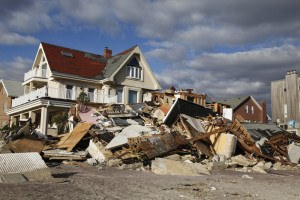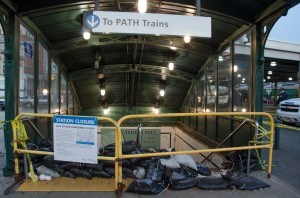Superstorm Sandy made landfall on October 29, 2012 near Atlantic City, N.J., causing an estimated $18.75 billion in insured property losses, making it the third most costly U.S. storm, according to ISO’s Property Claim Services (PCS).
Though there were more personal lines claims resulting from the almost 900 mile wide storm, commercial policyholders sustained greater losses. By insurance line there was $8.93 billion in commercial losses, $7.11 billion in personal lines losses and $2.72 billion in auto losses, PCS reported.
 At about $9.65 billion and $6.30 billion respectively, New York and New Jersey suffered the largest losses from Sandy, according to the Insurance Information Institute. Nearly 1.58 million claims were filed across 15 states and in the District of Columbia. Of the total claims filed, 1.13 million were personal lines claims, 258,000 were auto claims and 193,000 were commercial claims.
At about $9.65 billion and $6.30 billion respectively, New York and New Jersey suffered the largest losses from Sandy, according to the Insurance Information Institute. Nearly 1.58 million claims were filed across 15 states and in the District of Columbia. Of the total claims filed, 1.13 million were personal lines claims, 258,000 were auto claims and 193,000 were commercial claims.
The $18.75 billion figure excludes the insured flood losses covered by the federal government’s National Flood Insurance Program (NFIP). The NFIP to date has paid out $7.72 billion on 127,900 Sandy flood claims.

To mark the two year anniversary of Sandy, federal, state and local agencies celebrated completed repairs and restoration projects.
Secretary of the Interior Sally Jewell recently toured restoration projects in New Jersey as part of an effort to improve coastal resiliency on the Atlantic Coast.
“Hurricane Sandy was a wake-up call about the vulnerability of coastal communities and their economies to dangerous storms,” said Jewell. “With extreme weather events expected to become more frequent and more intense due to climate change, it’s critical that we continue to make strategic investments in our natural resources, like these restoration efforts in New Jersey that build community and economic resilience up and down the Atlantic coast.”
In the aftermath of Sandy, the Department of the Interior invested $787 million on recovery and resiliency projects along the Atlantic Coast. According to the federal agency, the funding will help protect coastal communities and their economies from the next super storm as well as from long-term impacts of climate change.
Last month, New York Congresswoman Carolyn Maloney greeted passengers to mark the reopening of the city’s G train.
“This is an exciting day because the G train is back and better than ever after much-needed repairs following damage from Super Storm Sandy,” said the Congresswoman. “The $84 million in repairs, which were entirely federally-funded, have made the G Train more resilient to any future extreme weather occurrences.”
The Red Cross released a report earlier this month on its continued efforts to assist Sandy victims. As of this month, the charity organization received more than $311 million in donations most of which has been used or is earmarked for continued recovery efforts.
Was this article valuable?
Here are more articles you may enjoy.

 Verlan Files Subro Suit Against Georgia Chemical Plant After $20M Payout on Fire
Verlan Files Subro Suit Against Georgia Chemical Plant After $20M Payout on Fire  Abbott Presses Congress for Shield Over Preemie Baby Formula Litigation That Could Cost It Billions
Abbott Presses Congress for Shield Over Preemie Baby Formula Litigation That Could Cost It Billions  Asahi Sales Drop Worsens as Cyber Hack Disruption Lingers
Asahi Sales Drop Worsens as Cyber Hack Disruption Lingers  Standard Chartered Settles $2 Billion Iranian Sanction Suit in London
Standard Chartered Settles $2 Billion Iranian Sanction Suit in London 